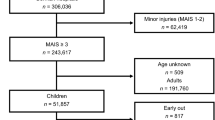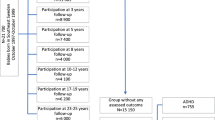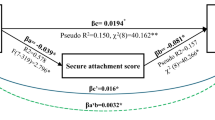Abstract
Background
Despite efforts to reduce the incidence of abusive head trauma (AHT), incidence rates remain high. One cause is that prevention programs mostly aim to educate mothers of newborns on AHT and infant crying. However, mothers commonly have already a high knowledge and constitute only a minority among identified AHT perpetrators. The hypothesis was that there are great differences in AHT awareness in different subgroups. To assess awareness of AHT, a population-based study was performed.
Methods
A population-based representative sample of the German population aged >14 years (N = 2510) was assessed in a cross-sectional observational survey. The sample was selected in a random route approach between November 2017 and February 2018.
Results
Overall knowledge of AHT was higher in women (67.9%) than in men (48.8%, p < 0.001). Female gender, having children, higher age, and level of education were predictors for the awareness of AHT. A majority of participants reported to have heard about AHT from the media.
Conclusions
Awareness of AHT differs significantly within the population. In groups at higher risk to perpetrate AHT, including men, young caregivers, and those with low educational level, awareness of AHT was low. These subgroups should be targeted by tailored education programs for prevention.
Similar content being viewed by others
Log in or create a free account to read this content
Gain free access to this article, as well as selected content from this journal and more on nature.com
or
References
Bechtel, K. et al. Impact of an educational intervention on caregivers’ beliefs about infant crying and knowledge of shaken baby syndrome. Acad. Pediatr. 11, 481–486 (2011).
Barr, R. G. et al. Do educational materials change knowledge and behaviour about crying and shaken baby syndrome? A randomized controlled trial. CMAJ 180, 727–733 (2009).
Barr, R. G. et al. Effectiveness of educational materials designed to change knowledge and behaviors regarding crying and shaken-baby syndrome in mothers of newborns: a randomized, controlled trial. Pediatrics 123, 972–980 (2009).
Deyo, G., Skybo, T. & Carroll, A. Secondary analysis of the “Love Me…Never Shake Me” SBS education program. Child Abus. Negl. 32, 1017–1025 (2008).
Fujiwara, T. et al. Effectiveness of educational materials designed to change knowledge and behavior about crying and shaken baby syndrome: a replication of a randomized controlled trial in Japan. Child Abus. Negl. 36, 613–620 (2012).
Simonnet, H. et al. Parents’ behavior in response to infant crying: abusive head trauma education. Child Abus. Negl. 38, 1914–1922 (2014).
Kelly, P., Wilson, K., Mowjood, A., Friedman, J. & Reed, P. Trialling a shaken baby syndrome prevention programme in the Auckland District Health Board. N. Z. Med J. 129, 39–50 (2016).
Boop, S., Axente, M., Weatherford, B. & Klimo, P. Abusive head trauma: an epidemiological and cost analysis. J. Neurosurg. Pediatr. 18, 542–549 (2016).
Dias, M. S. et al. Association of a postnatal parent education program for abusive head trauma with subsequent pediatric abusive head trauma hospitalization rates. JAMA Pediatr. 171, 223–229 (2017).
Fanconi, M. & Lips, U. Shaken baby syndrome in Switzerland: results of a prospective follow-up study, 2002-2007. Eur. J. Pediatr. 169, 1023–1028 (2010).
German Society of Pediatric Surgery. Accidents and Abuse Most Frequent Causes of Death in Infants (German Society of Pediatric Surgery, Berlin, 2013).
Statistisches Bundesamt (Destatis) 2018 Bevölkerung - Geburten 2017.
Altman, R. L. et al. Parent education by maternity nurses and prevention of abusive head trauma. Pediatrics 128, e1164–e1172 (2011).
Dias, M. S. et al. Preventing abusive head trauma among infants and young children: a hospital-based, parent education program. Pediatrics 115, e470–e477 (2005).
Keenan, H. T. & Leventhal, J. M. A case-control study to evaluate Utah’s shaken baby prevention program. Acad. Pediatr. 10, 389–394 (2010).
Zolotor, A. J. et al. Effectiveness of a statewide abusive head trauma prevention program in North Carolina. JAMA Pedia. 169, 1126–1131 (2015).
Barr, R. G. et al. Eight-year outcome of implementation of abusive head trauma prevention. Child Abus. Negl. 84, 106–114 (2018).
Esernio-Jenssen, D., Tai, J. & Kodsi, S. Abusive head trauma in children: a comparison of male and female perpetrators. Pediatrics 127, 649–657 (2011).
Schnitzer, P. G. & Ewigman, B. G. Child deaths resulting from inflicted injuries: household risk factors and perpetrator characteristics. Pediatrics 116, e687–e693 (2005).
Starling, S. P., Holden, J. R. & Jenny, C. Abusive head trauma: the relationship of perpetrators to their victims. Pediatrics 95, 259–262 (1995).
Adamsbaum, C., Grabar, S., Mejean, N. & Rey-Salmon, C. Abusive head trauma: judicial admissions highlight violent and repetitive shaking. Pediatrics 126, 546–555 (2010).
De Leeuw, M., Beuls, E., Parizel, P., Jorens, P. & Jacobs, W. Confessed abusive blunt head trauma. Am. J. Forensic Med. Pathol. 34, 130–132 (2013).
Leventhal, J. M., Asnes, A. G. & Bechtel, K. Prevention of pediatric abusive head trauma: time to rethink interventions and reframe messages. JAMA Pediatr. 171, 218–220 (2017).
Kelly, P. et al. Perinatal risk and protective factors for pediatric abusive head trauma: a multicenter case-control study. J. Pediatr. 187, 240.e4–246.e4 (2017).
Barlow, K. M. & Minns, R. A. Annual incidence of shaken impact syndrome in young children. Lancet 356, 1571–1572 (2000).
Stiffman, M. N., Schnitzer, P. G., Adam, P., Kruse, R. L. & Ewigman, B. G. Household composition and risk of fatal child maltreatment. Pediatrics 109, 615–621 (2002).
Kotch, J. B. et al. Risk of child abuse or neglect in a cohort of low-income children. Child Abus. Negl. 19, 1115–1130 (1995).
Finkelhor, D. & Ormrod, R. Crimes against Children by Babysitters. Juvenile Justice Bulletin - NCJ198102 (U.S. Department of Justice, Office of Justice Programs, Office of Juvenile Justice and Delinquency Prevention, Washington D.C., 2001).
Mann, A. K., Rai, B., Sharif, F. & Vavasseur, C. Assessment of parental awareness of the shaken baby syndrome in Ireland. Eur. J. Pediatr. 174, 1339–1345 (2015).
Russell, B. S. & Britner, P. A. Measuring shaken baby syndrome awareness: preliminary reliability of a caregiver attitudes and beliefs survey. J. Child Fam. Stud. 15, 760–772 (2006).
Ornstein, A. E., Fitzpatrick, E., Hatchette, J., Woolcott, C. G. & Dodds, L. The impact of an educational intervention on knowledge about infant crying and abusive head trauma. Paediatr. Child Health 21, 74–78 (2016).
Kish, L. A procedure for objective respondent selection within the household. J. Am. Stat. Assoc. 44, 380–387 (1949).
Scribano, P. V., Makoroff, K. L., Feldman, K. W. & Berger, R. P. Association of perpetrator relationship to abusive head trauma clinical outcomes. Child Abus. Negl. 37, 771–777 (2013).
Author information
Authors and Affiliations
Contributions
O.B., A.W., and V.C. conceptualized and designed the study, carried out the initial analyses, drafted the initial manuscript, and reviewed and revised the manuscript. E.B., P.L.P., and J.M.F. conceptualized and designed the study, designed the data collection instruments, coordinated and supervised data collection, and critically reviewed the manuscript for important intellectual content. All authors approved the final manuscript as submitted and agree to be accountable for all aspects of the work.
Corresponding author
Ethics declarations
Competing interests
P.L.P. has received research funding from the Bundesinstitut für Arzneimittel und Medizinprodukte, BMBF (Federal Ministry of Education and Research), VW-Foundation, Baden-Württemberg Stiftung, Lundbeck, and Servier. P.L.P. holds no stocks of pharmaceutical companies. Within the past five years, J.M.F. received research funding from the European Union (EU), German Research Foundation (DFG), the German Federal Ministry of Health (BMG), the German Federal Ministry of Education and Research (BMBF), the German Federal Ministry of Family Affairs, Senior Citizens, Women and Youth (BMFSFJ), several state ministries of social affairs, State Foundation Baden-Württemberg, Volkswagen Foundation, European Academy, Pontifical Gregorian University, RAZ, CJD, Caritas, and Diocese of Rottenburg-Stuttgart. He has received travel grants, honoraria and sponsoring for conferences and medical educational purposes from the German Research Foundation (DFG), the American Academy of Child and Adolescent Psychiatry (AACAP), the National Institute of (Mental) Health (NIMH/NIH), the European Union (EU), Pro Helvetica, Janssen-Cilag (J&J), Shire, several universities, professional associations, and German federal and state ministries. He has conducted clinical trials for Janssen-Cilag, Lundbeck, the German Federal Ministry of Education and Research (BMBF) and Servier. He is in steering committees and DSMB for Lundbeck, Servier. Every grant and honorarium has to be declared to the law office of the University hospital Ulm. Potential conflicts of interests have to be declared to German Society for Child and Adolescent Psychiatry and Psychotherapy (DGKJP) and American Academy of Child and Adolescent Psychiatry (AACAP) annually, because of commission membership. He has no stocks, no interests in pharmaceutical companies, and is a majority owner of the 3Li institute. The other authors declare no competing interests.
Additional information
Publisher’s note: Springer Nature remains neutral with regard to jurisdictional claims in published maps and institutional affiliations.
Supplementary information
Rights and permissions
About this article
Cite this article
Berthold, O., Clemens, V., Witt, A. et al. Awareness of abusive head trauma in a German population-based sample: implications for prevention. Pediatr Res 86, 537–541 (2019). https://doi.org/10.1038/s41390-019-0467-8
Received:
Revised:
Accepted:
Published:
Version of record:
Issue date:
DOI: https://doi.org/10.1038/s41390-019-0467-8
This article is cited by
-
Adverse childhood experiences are associated with a higher risk for increased depressive symptoms during Covid-19 pandemic – a cross-sectional study in Germany
BMC Psychiatry (2022)
-
Kinderschutz im Gesundheitswesen verbessern: Fachberatung, Weiterbildung und Forschung am Beispiel des misshandlungsbedingten Kopftraumas
Bundesgesundheitsblatt - Gesundheitsforschung - Gesundheitsschutz (2019)



